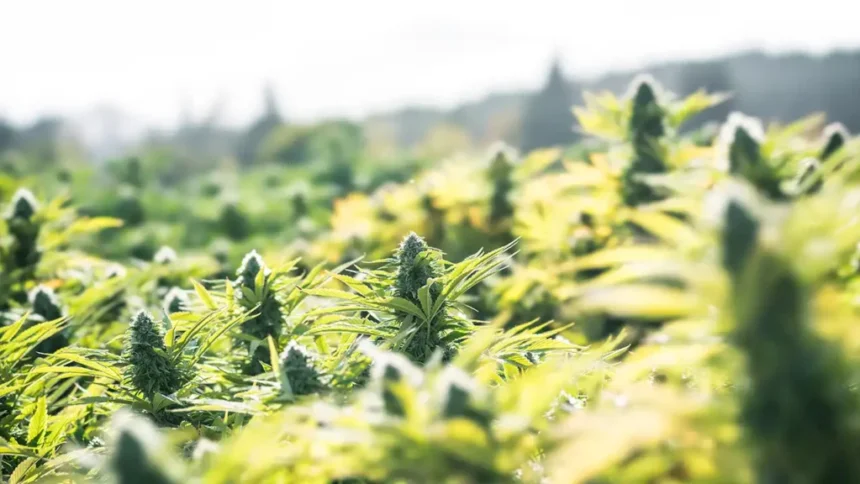A coalition of marijuana companies has filed a petition asking the U.S. Supreme Court to take up their case challenging the constitutionality of federal prohibition.
About two months after the court accepted an application for an extend the filing deadline, the law firm Boies Schiller Flexner LLP that’s representing the companies submitted the petition for writ of certiorari on Friday.
The case from Massachusetts-based marijuana companies and industry leaders—Canna Provisions, Gyasi Sellers, Wiseacre Farm and Verano Holdings–argues that the Commerce Clause of the U.S. Constitution precludes the federal government from enforcing criminalization laws against intrastate cannabis activity.
To that end, they want justices to reevaluate a landmark 2005 case, Gonzales v. Raich, wherein the Supreme Court narrowly determined that the federal government could enforce prohibition against cannabis cultivation that took place wholly within California based on Congress’s authority to regulate interstate commerce.
The new Supreme Court petition argues that the Raich decision was “an aberration” in the court’s precedents on the Commerce Clause and Necessary and Proper Clause, and represents “a drastic departure from the federalism principles those clauses embody.”
The ruling two decades ago permitted a “dramatic intrusion on the exercise of the States’ police powers,” it says.
The Controlled Substances Act’s (CSA) “significance to the exercise of the States’ police powers is massive and even greater today than it was in Raich’s time, when only nine states had legalized marijuana,” the petition says. “Thirty-eight states have now decided that the health and safety of their citizens is better served by making marijuana available through regulated channels than through prohibition. The CSA displaces those states’ choices and imposes Congress’s own views on intrastate policy. The serious federalism questions raised by that intrusion warrant the Court’s attention now, as they did in Raich.”
The petition says that after the Raich decision was issued, the federal government has “undermined the notion of any link between the CSA’s interstate goals and its intrastate prohibitions.”
“Since 2014, Congress has barred enforcement against state-regulated medical marijuana but not adult-use marijuana (while leaving both prohibited under the CSA). State-regulated medical marijuana is therefore less regulated, from a federal perspective, than the least-controlled Schedule V substances in the CSA. The DOJ has taken non-enforcement even further, with a policy of not enforcing the CSA as to either state-regulated medical or adult-use marijuana… This long period of desuetude has severed any link between controlling state-regulated marijuana and regulating interstate commerce, thereby rendering the CSA’s intrusion on the States’ policymaking even more stark.”
A U.S. appeals court rejected the arguments of the state-legal cannabis companies in May. It was one the latest blows to the high-profile lawsuit following a lower court’s dismissal of the claims. But it’s widely understood that the plaintiffs’ legal team has long intended the matter to end up before the nine high court justices.
Four justices must vote to accept the petition for cert in order for the court to take up the case.
While it remains to be seen whether SCOTUS will ultimately take the case, one sign that at least some on court might be interested in the appeal is a 2021 statement from Justice Clarence Thomas, issued as the court denied review of a separate dispute involving a Colorado medical marijuana dispensary.
Thomas’s comments at the time seemed to suggest it’d be appropriate revisit Raich—a move that could upend federal prohibition.
The statement pointed to policy developments since the earlier case was decided, such as the hands-off enforcement approach taken by the Department of Justice as more states legalized cannabis and a congressional budget rider protecting state-legal medical marijuana programs.
“Whatever the merits of Raich when it was decided, federal policies of the past 16 years have greatly undermined its reasoning,” Thomas wrote, describing the government’s approach to cannabis enforcement as “a half-in, half-out regime that simultaneously tolerates and forbids local use of marijuana.”
“Though federal law still flatly forbids the intrastate possession, cultivation, or distribution of marijuana…the Government, post-Raich, has sent mixed signals on its views,” the justice continued, saying the situation “strains basic principles of federalism and conceals traps for the unwary.”
The initial complaint in the current case now known as Canna Provisions v. Bondi, filed in U.S. District Court for the District of Massachusetts, argued that government’s ongoing prohibition on marijuana under the Controlled Substances Act (CSA) was unconstitutional because Congress in recent decades had “dropped any assumption that federal control of state-regulated marijuana is necessary.”
At oral argument on appeal late last year, David Boies told judges that under the Constitution, Congress can only regulate commercial activity within a state—in this case, around marijuana—if the failure to regulate that in-state activity “would substantially interfere [with] or undermine legitimate congressional regulation of interstate commerce.”
Boies, chairman of the firm, has a long list of prior clients that includes the Justice Department, former Vice President Al Gore and the plaintiffs in a case that led to the invalidation of California’s ban on same-sex marriage, among others.
Judges, however, said they were “unpersuaded,” ruling in an opinion that “the CSA remains fully intact as to the regulation of the commercial activity involving marijuana for non-medical purposes, which is the activity in which the appellants, by their own account, are engaged.”
The district court, meanwhile, said in the case that while the there are “persuasive reasons for a reexamination” of the current scheduling of cannabis, its hands were effectively tied by past U.S. Supreme Court precedent in Raich.
This comes in the background of a pending marijuana rescheduling decision from the Trump administration. President Donald Trump said in late August that he’d make a determination about moving cannabis to Schedule III of the CSA within weeks, but he’s yet to act.
Meanwhile, this week the Supreme Court agreed to hear a separate case on the constitutionality of a federal law prohibiting people who use marijuana or other drugs from buying or possessing firearms. The Trump administration has argued that the policy “targets a category of persons who pose a clear danger of misusing firearm” and should be upheld.




























